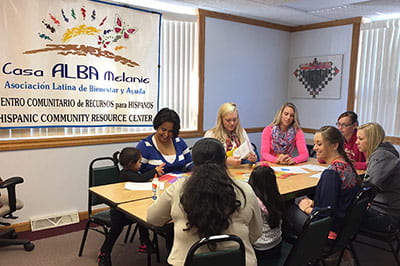Education students gain hands-on experience at Casa Alba
 For most college courses, the goal is to teach students the skills they will need to be successful in the future. But in Assistant Prof. Aurora Cortes’ new class, that aim is coupled with the desire to positively impact the lives of those in the Hispanic community — starting today.
For most college courses, the goal is to teach students the skills they will need to be successful in the future. But in Assistant Prof. Aurora Cortes’ new class, that aim is coupled with the desire to positively impact the lives of those in the Hispanic community — starting today.
Through the “Working and Communicating with Hispanic Parents of Young Children” course, 13 students have been visiting Casa Alba, a resource center for the Hispanic community, and conducting classes with young children and their parents.
The idea for the course came from a discussion between Cortes and a colleague, Associate Prof. Linda Tabers-Kwak. Tabers-Kwak teaches a course titled “Working and Communicating with Parents of Young Children,” and suggested that Cortes form a similar course focused on the Hispanic community.
Cortes had already begun visiting Casa Alba, which opened in the spring of 2012. She met the founder, Sister Melanie Maczka, and thought the new course could fit in well at the center.
“So I went and I talked to Sister Melanie in the spring of 2014 and I asked her, ‘Would you like me to start this program here at Casa Alba?’ ” Cortes said. “She thought it was fantastic.”
Added Maczka:
“We’re very proud and honored to be working with UWGB. I think that this partnership is wonderful.”
Click thumbnails to enter slideshow view.






While visiting the center, students form groups with the mothers and their 1-to 3-year-old children and teach literacy activities. These include reading bilingual books, where the student reads one page in English and the mother repeats the page in Spanish; helping the children create their own little book; and using other learning materials such as play dough, chalk and flash cards. They also have a traveling library where children can check out books to read at home.
The program has one main goal: to overcome language and cultural barriers. Cortes could sense this barrier with her students, especially from those who didn’t speak Spanish. But Cortes believes the language barrier is often not the problem.
“I think we have the same values and they’re universal values and I think the problem is we have them in different orders,” Cortes said, ”We have different priorities and that’s where there’s misunderstandings.”
While experiencing this firsthand, students have come to realize the importance that the Hispanic culture places on family. Several students said that knowing this will help them to manage their own classrooms in the future.
“You need to know the background of who you’re working with before you can truly understand what their life is like,” student Brooke Koltz said.
“We can better understand why they’re not here or reasons behind their choice,” said student Katie Tillmann, “It’s not that they don’t want to but it’s that they have other priorities that are higher than education or coming out in the cold.”
But the class isn’t just a learning opportunity for the students. Cortes hopes it will help the mothers and their children as well.
“So this experience, I believe, is going to very beneficial for the community,” Cortes said. “And then hopefully those kids have had the right beginning. Once they get into kindergarten they know what it’s all about. They know about books. They’re going to feel comfortable. They’ve done it before and the mothers are realizing the importance of school.”
Maczka added that the experience will provide the opportunity for the children to socialize with other children, something that they often aren’t given the chance to do.
“A lot of time it’s difficult for moms or the caregivers to interact with families,” she said. “They’re stuck at home with the child during the day and children simply know mom and their siblings, and maybe on weekends other family members and friends, but otherwise they don’t interact a lot with other children.”
When conducting similar activities with her own parents of young children group, Tabers-Kwak told Cortes that one way to gauge the success of the program was to look at the participation of the father.
“The minute a father goes, that means it’s very successful,” Cortes said. “What this means is that the mother is talking about the experience at home and the father wants to know. So, last week we had our first father. That was fantastic. And the father was actually reading to his little girl and the little girl was proud that Dad was there, sharing that experience.”
Fall 2014 is the first semester the course has been offered, and already there have been success stories. For one family, the experience has been incredibly important in the development of their daughter. Cortes learned about the situation while talking to the mother.
“Her daughter (was) not talking,” Cortes said, “Anything. Not even a sound, nothing. She’s been going through speech therapy for about a year, and then now, she’s started talking.”
The students working with the family noticed the change as well.
“She’s starting to open up more. Week-by-week she’s talking more,” said student Heather Walden. “(It) may not always be words but you can tell she’s more engaged and more excited.”
After seeing the success of the program after just one semester, everyone is excited to see what this partnership will bring in the future.
“We want kids to feel so good about education and about their capacity that they want to keep growing,” Maczka said. “And who better than the University to do that with.”
– Story by Katelyn Staaben ’15, editorial intern, Office of Marketing and University Communication


